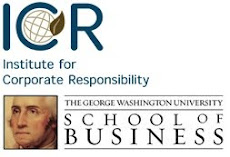The functional nature of an MBA program naturally favors the compartmentalization of knowledge, and therein lays the great strength and deficiency of modern professionalism. The strengths are evident in the measurable productivity of modern professionals. The deficiencies are subjective in nature and thus easily ignored – if you can’t measure it, it doesn’t matter… Yet what is deficient is nothing less than wisdom, that marginalized concept which at its core indicates a holistic appreciation of one’s community, however defined.
There are three marginalized aptitudes that I passionately believe should be incorporated into the very soul of an MBA program, so that by permeating the process they nurture the development of a business class worthy of leading humanity into the 21st century. Let there be no question that I believe the business class has as thus far proven itself unworthy of the honor. The first two aptitudes apply directly to corporate social responsibility, the third concerns an individual’s ability to positively engage his fellows – they are: (1) The harmonizing of personal and social values with business practice (i.e., how to pursue business without acting hypocritically), (2) The proper treatment of individuals and communities, and (3) The art of effective communication.
I discuss these subjects not because I am dissatisfied with GWU’s GMBA program in particular. During my 20+ years as a student - stretching from grade school, through two undergraduate degrees and into this MBA program - I have experienced negligible institutional interest in nurturing these aptitudes. The reason for this omission is that they are of a holistic rather than a functional nature. They are neither readily measurable nor do they lend themselves to a resume – yet they provide the bridge between mere intelligence and wisdom. Intelligence has been in high demand of late - optimized by the whiz kids of Wall Street. Wisdom, in contrast, has become a sorely undervalued resource. The result has been growth in profitability and stagnation in life satisfaction – that, at least, is measurable – coupled with a sustained rise in mental disorders, depression being foremost among them. Social scientists are in overwhelming agreement that (a) wealth reduces suffering, up to a point, and (b) material prosperity does not produce sustained joie de vivre. Only healthy relationships and strong communities have consistently proven capable of producing that elusive prize.
How might the aptitudes that underlie wisdom be better developed at GWU? The first facility, sincere behavior, is amenable to classroom discussion. Hypocrisy is a disease that flourishes in the darkness of silent certainty but cannot abide the light of open dialogue. Extending classroom discussions to include the complex social effects of business decision will help to force students to reconcile their proposed actions with their internal ideals. Discussion must extend beyond appeals to double or triple bottom line awareness by continuously responding to the question: would this decision contribute to a more ideal world, a world I would wish upon my children and, importantly, upon the children of mothers and fathers in every corner of the globe? Of course each individual’s ideal world will differ, as it should. This line of thought will not force students to arrive at the same conclusions, but it will demand the recognition of values as the proper fountainhead of action, rather than as intellectual curiosities.
The art of treating people well is of a more practical nature and lends itself more naturally to the classroom. Dale Carnegie’s classic, How to Win Friends and Influence People, provides a suitable starting point to understanding how to nurture interpersonal relationships. This lesson is particularly important to future managers, as we expect ourselves to be, and it is unfortunate that MBA curriculum talks up but does not teach how to build relationships. Perhaps it is hoped that students’ interpersonal skills are fully developed prior to entering graduate school – a happy but hopeless prospect. Interpersonal skills are myriad and include understanding the unstated needs of others, generating trust, critiquing without alienating, and helping others build confidence. There is no standard metric for measuring these objectives, but there are more and less effective behaviors and MBAs, as with the general population, are not given the training to employ them well. The ability to treat people well stems directly from the ability to communicate effectively, which is the third objective on my list.
As with interpersonal relationships, we might hope that MBA students intuitively know how to communicate effectively. But empirical evidence suggests that we communicate as well as the next bloke. We are trained to be superior and superior communication is a central asset of successful managers. Do we listen with precision and comprehension? Can we succinctly express a sudden thought? Classroom experience suggests not. Do we even know how to analyze an audience prior to framing an argument? We might have an idea, but we certainly have no system for doing so. Some of these skills are holistic and must be incorporated into the very structure of education, others can be developed through the study of techniques and flexible rules – all are crucial to the development of effective managers and, indeed, effective community members.
Erik Walenza-Slabe Global MBA, 2011




